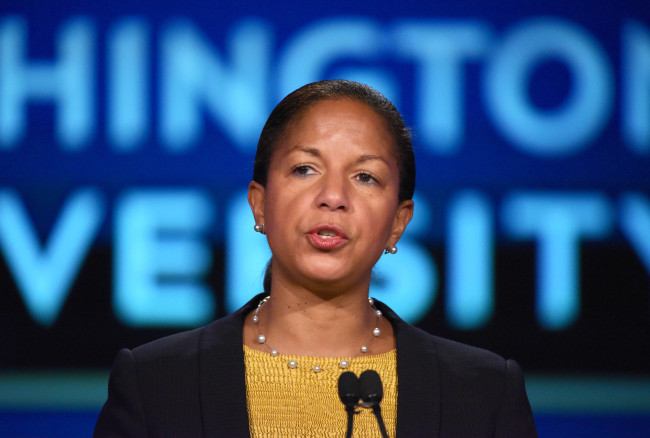The relations between the U.S. and North Korea show no signs of improving with Washington increasing pressure on Pyongyang to give up its nuclear program, while the latter continues to shift the blame to the former for bilateral antipathy.

Their diplomatic tensions are expected to further escalate later this week as the U.S. is expected to call on China to exert more influence to stop the recalcitrant regime from engaging in provocative acts and further advancing its nuclear weapons capabilities.
U.S. National Security Adviser Susan Rice said Monday that the summit between U.S. President Barack Obama and his Chinese counterpart Xi Jinping, slated for Friday, will be an “opportunity” for the leaders to step up efforts to denuclearize the North.
“China is a fulcrum of influence for the DPRK (North Korea), and this week’s meetings between Presidents Obama and Xi will be another opportunity to discuss how we can sharpen Pyongyang’s choices between having nuclear weapons and developing economically,” she said during her speech at George Washington University.
“Neither the United States nor China will accept North Korea as a nuclear weapons state,” she added, stressing that Washington and Beijing are “equally united” in demanding the complete and verifiable denuclearization of the Korean Peninsula.
In defiance of the international criticism against its pursuit of nuclear arms, Pyongyang has continued to improve its nuclear capabilities, arguing that it needs to strengthen “nuclear deterrence” against what it calls U.S.’ hostile policy.
The North has already defined itself as a nuclear power state in its constitution, and adopted the “Byungjin” policy of simultaneously developing nuclear arms and its economy. It has also claimed that it has already entered a technical phase to “miniaturize and diversify” nuclear bombs.
Observers say that the North may use its military parade, slated for Oct. 10, the 70th anniversary of the founding of its ruling Workers’ Party, to show off its military capabilities including long-range delivery vehicles that could potentially be tipped with a nuclear warhead.
Since the breakup of the 2012 “Leap Day” deal between Washington and Pyongyang, the bilateral relationship has continued to deteriorate.
The deal, under which Pyongyang agreed to put a moratorium on nuclear and missile tests in return for 240,000 tons of nutritional assistance, was breached after the North fired a long-range rocket less than two months later -- an incident that deepened mutual distrust.
Bilateral friction further increased in late 2014 when the U.S. pinpointed the North as a culprit for the cyberattack on Sony Pictures Entertainment, and imposed fresh sanctions against it in retaliation for the alleged hacking.
After the world powers signed a deal with Iran in July to curb its nuclear program, hopes grew that the U.S. would pay more attention to the North Korean issue. But with much work regarding the enforcement of the Iranian deal, Washington seems to maintain what commenters called a policy of “strategic patience” toward Pyongyang, experts said.
“The U.S. still seems to lack the will and efforts to address North Korea’s nuclear issue -- a reason why South Korea should employ a brisk diplomacy to create the momentum to tackle the issue,” said Park Won-gon, a security expert at Handong Global University.
“I believe the upcoming summit between Obama and Xi, and between Park and Obama (slated for Oct. 16) will be a very important chance to call more attention to the issue of North Korea’s nuclear program, which will continue to grow should it be left unattended.”
Meanwhile, the foreign ministers of South Korea, the U.S. and Japan plan to discuss their joint efforts to prevent additional North Korean provocations and the growth of the North’s nuclear program during a trilateral meeting on Sept. 29 on the sidelines of the U.N. General Assembly in New York.
Pyongyang hinted that it would launch a “satellite” to mark the 70th anniversary of the party’s founding. Seoul and Washington believe that Pyongyang seeks to test its long-range rocket under the guise of a satellite launch.
By Song Sang-ho(sshluck@heraldcorp.com)







![[From the Scene] Monks, Buddhists hail return of remains of Buddhas](http://res.heraldm.com/phpwas/restmb_idxmake.php?idx=644&simg=/content/image/2024/04/19/20240419050617_0.jpg&u=20240419175937)







![[From the Scene] Monks, Buddhists hail return of remains of Buddhas](http://res.heraldm.com/phpwas/restmb_idxmake.php?idx=652&simg=/content/image/2024/04/19/20240419050617_0.jpg&u=20240419175937)

![[KH Explains] Hyundai's full hybrid edge to pay off amid slow transition to pure EVs](http://res.heraldm.com/phpwas/restmb_idxmake.php?idx=652&simg=/content/image/2024/04/18/20240418050645_0.jpg&u=20240419100350)

![[Today’s K-pop] Illit drops debut single remix](http://res.heraldm.com/phpwas/restmb_idxmake.php?idx=642&simg=/content/image/2024/04/19/20240419050612_0.jpg&u=)